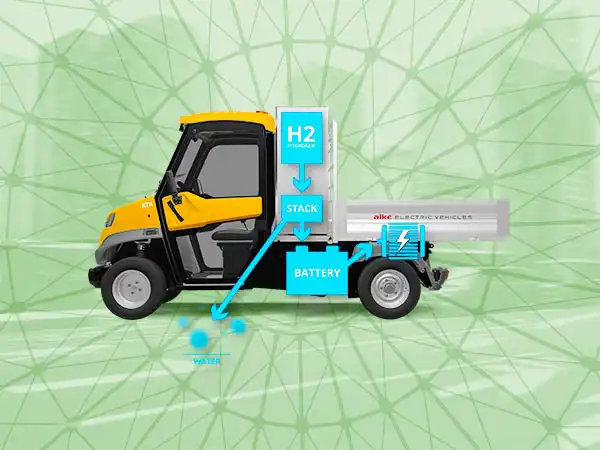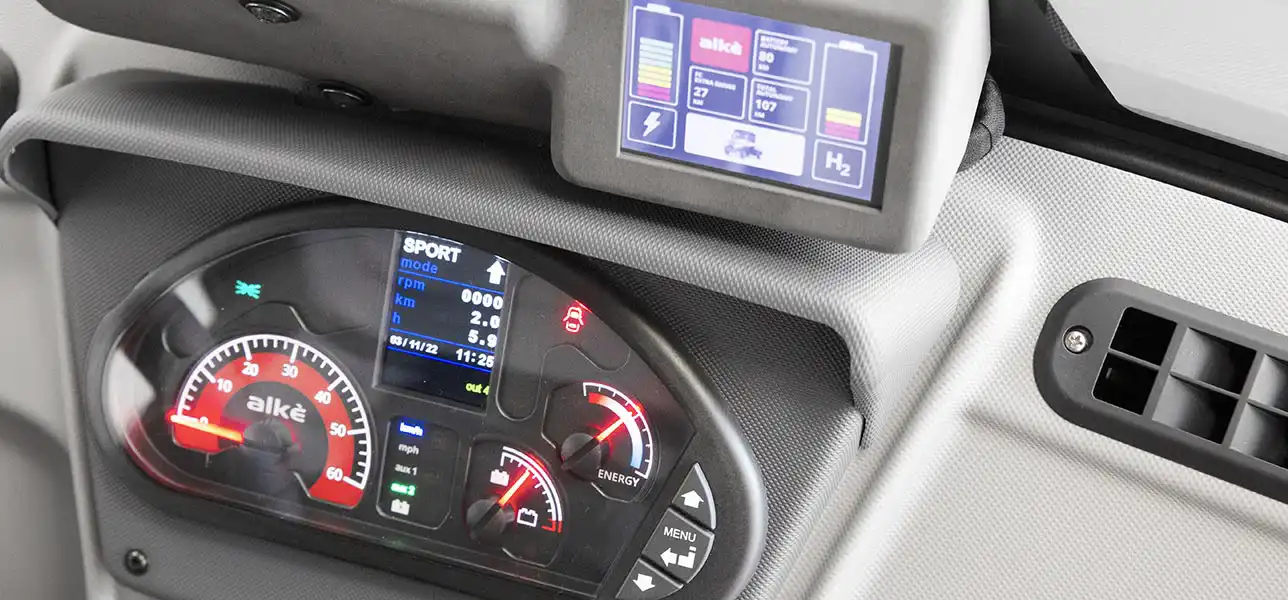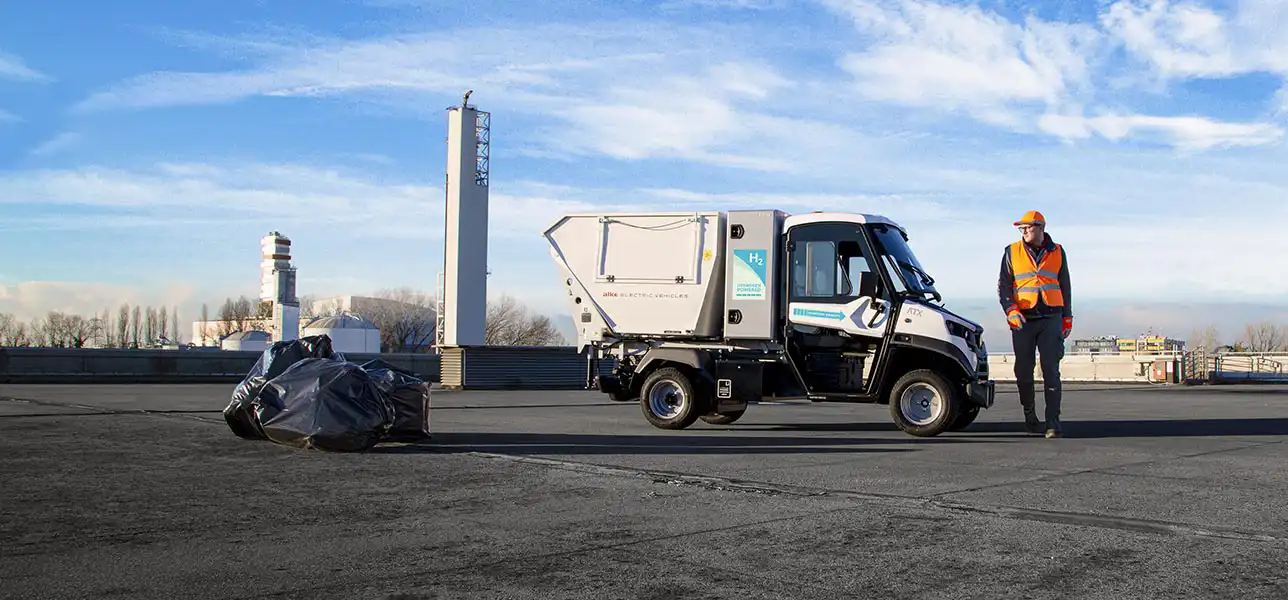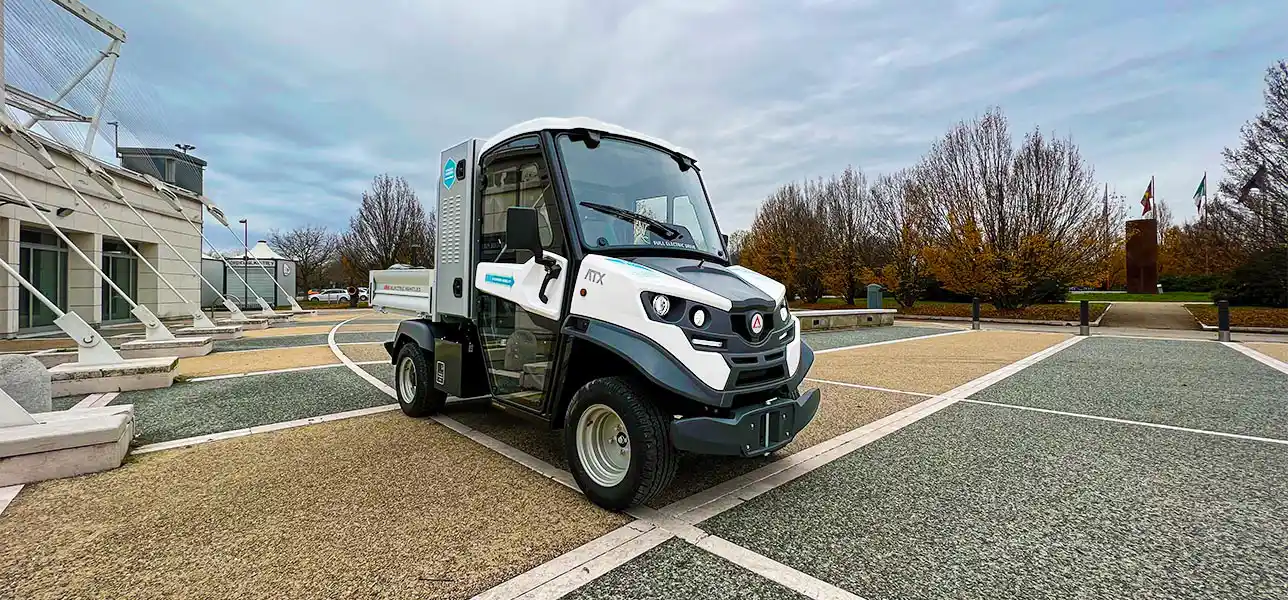

How do Hydrogen vehicles work?
If you are ready to take a step forward in the world of transport, it's time to discover hydrogen vehicles. Let’s contribute to a cleaner, more environmentally sustainable future.
Why should you choose a hydrogen vehicle?
- Zero emissions: they are completely environmentally friendly
- Longer range: comparable to conventional vehicles
- Fast refuelling: only a few minutes
- Quiet and comfortable: thanks to their advanced technology

How a hydrogen vehicle works
A hydrogen vehicle, also known as a hydrogen fuel cell vehicle (FCEV), works by using hydrogen as fuel to generate the energy needed to move the vehicle. The operation process of a hydrogen vehicle can be divided into several stages:
| Hydrogen vehicle operation phase | Description |
| Hydrogen storage: | Hydrogen is stored in high-pressure tanks inside the vehicle. These tanks are designed to keep the hydrogen in compressed form, which allows a significant amount of fuel to be stored in a relatively small space. |
| Energy production: | Hydrogen is supplied to the vehicle's fuel cell, which is the heart of the system. Inside the fuel cell, hydrogen is combined with atmospheric oxygen (taken from the air) in a chemical reaction called 'reverse electrolysis' or 'redox reaction'. This reaction generates electricity through an electrochemical process. |
| Generation of electricity: | During the reaction inside the fuel cell, hydrogen splits into positive ions (protons) and negative ions (electrons). The positive ions cross an electrolyte membrane and combine with the negative ions and oxygen to form water (H2O). Meanwhile, the electrons that are released by the reaction create a usable electric current. |
| Powering the motor: | L'energia elettrica generata nella cella a combustibile viene quindi inviata a un motore elettrico, che trasforma l'energia in movimento meccanico. Questo motore è responsabile della trazione delle ruote del veicolo. |
| Water emission: | The only by-product of this reaction is water. Thus, the main emission of a hydrogen vehicle is water vapour. |
Hydrogen vehicles offer several advantages, including a range comparable to that of conventional fossil-fuelled vehicles, fast refuelling times and zero harmful gas emissions. However, it is important to note that the production, distribution and storage of hydrogen require specialised infrastructure, and that the production of hydrogen itself, like other energy sources, may involve carbon emissions unless it is produced using renewable energy sources or low-carbon production processes.

An analysis of market alternatives and the current status of hydrogen vehicles
Interest in hydrogen vehicles has grown significantly in recent years due to their promise of sustainable mobility and zero harmful emissions. However, to fully understand the hydrogen vehicle landscape, it is crucial to also examine the market alternatives and the current state of development. To date, there are several environmentally friendly vehicle alternatives on the market. Battery Electric Vehicles (BEVs): these are widely spread and available on the market. They use rechargeable batteries to store electrical energy and power an electric motor. Ultimately, electric vehicles are proving their popularity thanks to a longer range, an increasingly extensive charging network, and lower operating costs than conventional vehicles. Plug-in Hybrid Vehicles (PHEV): combine an internal combustion engine with an electric motor and a rechargeable battery. These vehicles offer a greater range than BEVs, but still produce emissions when using the internal combustion engine. Hydrogen vehicles (FCEVs): use fuel cells to generate electricity and power an electric motor. They do not emit harmful gases during use, but require specialised infrastructure for hydrogen production, distribution and storage. Let us now look at the current state of development of hydrogen vehicles. Hydrogen vehicles have made significant progress in increasing range and reducing refuelling times. Some models offer a competitive range compared to conventional vehicles, and refuelling times are now similar to those of petrol- or diesel-powered vehicles. The availability of hydrogen infrastructure has increased in some regions, but it remains limited compared to electric charging stations. There are ongoing efforts to expand the network of hydrogen refuelling stations. Currently, FCEVs tend to be more expensive than BEVs and conventional vehicles due to the costs associated with fuel cells and hydrogen. As technologies improve and large-scale production grows, costs are expected to decrease over time.

All the advantages of fuel cell vehicles
Hydrogen vehicles are a pioneering solution to environmental challenges and offer sustainable mobility. Hydrogen vehicles have numerous advantages that make them an attractive choice for those wishing to contribute to environmental sustainability and benefit from a modern and convenient driving experience. So much so that they are also being considered for city transport and logistics. One of the main advantages of hydrogen vehicles is that they produce zero harmful emissions during use. The reaction between hydrogen and oxygen in fuel cell vehicles produces only water as a by-product, helping to improve air quality and reduce air pollution. Hydrogen vehicles offer a long range, often comparable or even greater than petrol or diesel vehicles. This makes them ideal for long journeys and for those who want an alternative to conventional vehicles without having to worry about frequent refuelling. Hydrogen refuelling takes only a few minutes, like the refuelling times of conventional vehicles. This speed eliminates the need for long waiting times at charging stations and offers greater convenience to motorists. The use of an electric motor in hydrogen vehicles offers a quiet and comfortable driving experience. This makes the journey more pleasant and reduces noise in urban areas.

